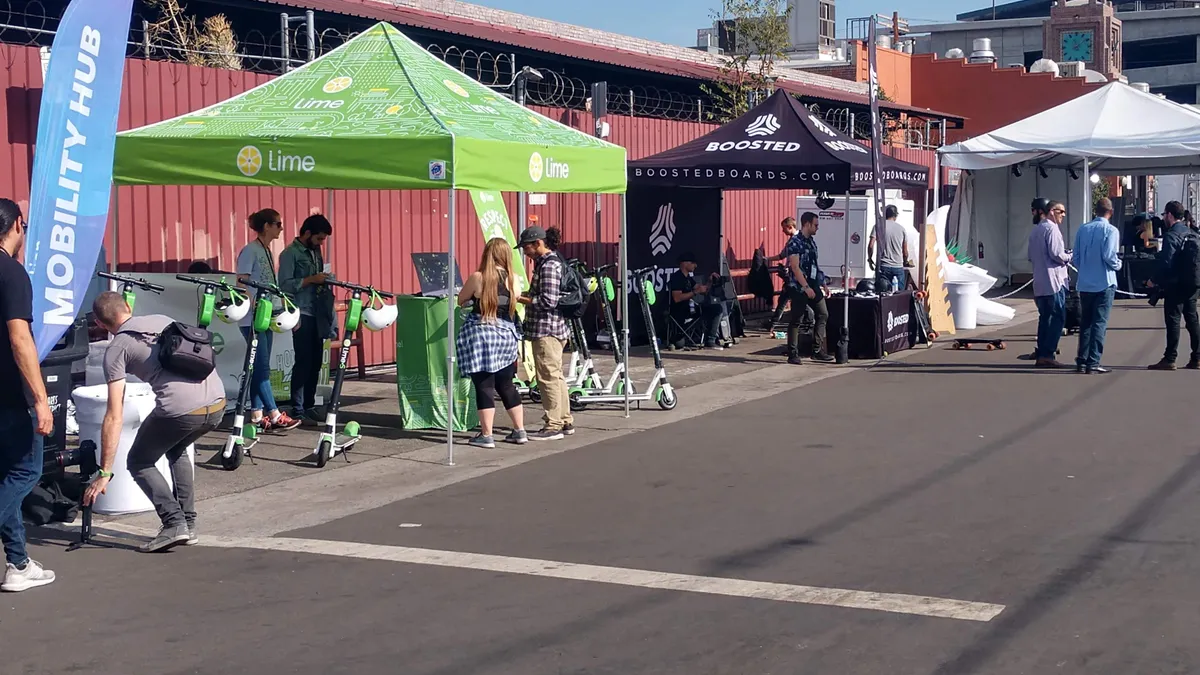LOS ANGELES — What would it look like if every mobility option — new, developing and established — was on the street all at once?
That question was an inspiration behind the LA CoMotion Mobility Festival, a one-day public extravaganza that showcased all the ways people can get around without jumping in their cars.
It made for a slightly chaotic scene; there were people zipping around on scooters, on electric bikes of varying kinds, and on unexpected options like electric skateboards.
In the middle of it all I stood, slightly befuddled, as I pondered the explosion of new micromobility options in the past year. The noise of the bells from the bikes and scooters rung in my ears, reminding me of the end of the song "Bicycle Race" by Queen.
But perhaps change isn't such a bad thing?
I hadn't expected to be part of a thorough on-road test at the festival, but when I hopped on a Navya autonomous shuttle, I experienced some of the safety features that have been widely discussed. The shuttle is at level four autonomy, meaning it can run on a fixed route and react to unexpected hazards using its LiDAR.
I stood on the shuttle with Aaron Foster, the company’s sales operations manager, and marveled at the fact that the shuttle was moving forward on its own in a straight line along the test area. Suddenly a pedestrian stepped out in front of it. Almost immediately, the shuttle slowed right down and sounded a warning bell. The pedestrian jumped out of the way and we continued on our path.
That was impressive, and I was similarly impressed when Foster told me that he has previously done pushups in front of the Navya shuttle as it drives toward him, all to demonstrate how its radar systems pick up obstacles and react to them.
The festival also had a variety of personal mobility vehicles on display. Having resisted joining the dockless bike and scooter phenomenon on a personal level, even as our coverage of the new trend has gathered steam, I took rides on a Lime scooter, a Jump scooter and on Jump's electric-assist bike.
Color me impressed. It was exhilarating to whip along at a princely 11 miles per hour on a Lime, and while I doubt it will shake my anxiety dreams about colliding with scooter riders on the streets of DC, it certainly gave me a new understanding for why these have caught on in so many cities.
Mark this day in your calendars as the first time I tried a dockless scooter. My verdict? Pretty fun. The suit, helmet and dorky smile is a good look #LACOMO18 pic.twitter.com/TYfW32Vmnu
— Chris Teale (@chris_teale) November 16, 2018
On the subject of Lime, I signed the company’s "Respect the Ride" pledge, promising to wear a helmet and not leave scooters strewn on the sidewalk. In an email soon after my signature, Lime thanked me for being "a committed rider."
I wasn't as graceful trying out some of the other mobility options on display. Jeff Russakow — the CEO of electric skateboard company Boosted, who joined me on stage during a conference panel I moderated — had assured me and the audience his product is totally safe, even for people that have never skated before.
I jumped on a board at the festival, took a brief tutorial and then set off down a test track, trying desperately to keep my balance and stay in a straight line. Knees shaking and feet wobbling, I just about kept things stable while accelerating and braking using a Bluetooth remote. Presumably with practice, I'd be in a better position to, as the company put it in an email to me that day, "spice up your commute."
After that experience, I stayed away from some of the other options, one of which outfitted riders with tiny motors under each foot to be steered with body weight. No thanks.
One trend that struck me is the growth of electric bikes that look more like small cars, not unlike the Peel P50 I remember being driven around London on an episode of the BBC show Top Gear.
I was a fan of the Veemo, an electric-assist bike with doors, electric windows, turn signals, headlights and a dashboard complete with GPS. Based in Vancouver, company representatives indicated to me they should roll out in that city next year. I'll be keeping an eye on that market to watch how the rickshaw-looking arrangements interact with traditional bicycles.
As the festival wrapped up, what did I learn? Change is afoot in mobility, and while it may be disruptive, there are plenty of smart people working on solutions. And while some may seem outlandish, you just never know what might catch on. After all, who’d have thought that dockless bikes and scooters would have gotten so popular a year ago?












